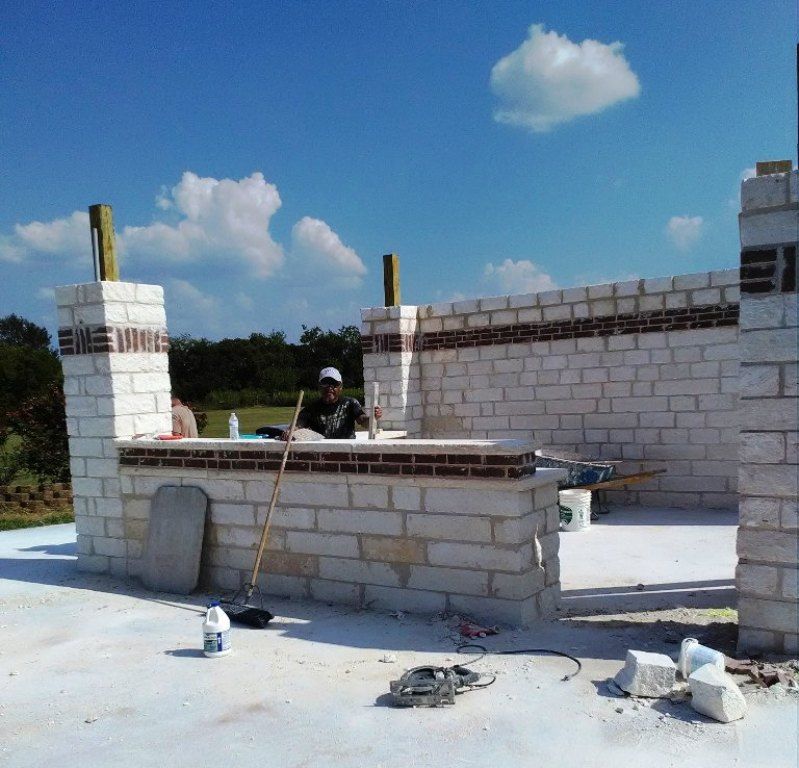
mainstreetlawn
5 Questions When Hiring a Stone Masonry Contractor
One way to give an elegant and finishing touch to your garden beds is to surround them with mortared stonework. If installed properly by a professional stone masonry contractor, this stonework should last many years and enhance not only the look of your landscaping, but add value and curb appeal to your home as well. However, quality stonework is not something you should entrust to just anyone. We recommend educating yourself about what goes into building a mortared stone wall and shopping around to ensure you hire someone with experience and a warranty. Use this guide 5 questions when hiring a stone masonry contractor to help vet your prospects.
Why Does Mortared Stonework Fail?
Far too often, we receive calls from customers in need of repair work to their existing mortared stone walls. Ninety percent of the time, after probing for more details, the customer didn’t use a local stonework mason and instead got a great price from “some guy” who was just passing through the neighborhood and less than 1 year later, the mortar is now cracking and parts of the wall had completely separated. We find that the cause of this cracking is almost always an improper foundation or footing to the stonework or sadly, no concrete footing at all.
Will I Need a Concrete Footing?
When you create mortared stonework, you are building a structural wall to sit on top of dirt. Dirt shifts and adjusts with the elements. Unless you create a strong and solid footing for your stonework to sit on, it will not take long until the shifting and settling in the dirt causes cracks in the mortar and stone. Even stone walls less than 6 inches tall need a secure footing. We recommend all mortared stone walls begin with a 3,000 psi (minimum) concrete footing at least 4″ deep. This concrete footing should include rebar for further reinforcement. If rebar is not being used, your stone mason should be using concrete maximizer, which is stronger than traditional concrete and rated at 5,500 psi. This concrete footing should be installed and leveled. This will help ensure that all the stone installed on top of it remains level and ensures that any settling occurs evenly throughout the stone work.
What About Landscape Drainage?
Water is the next biggest cause of stonework damage. If water sits behind the stone wall for too long, it will create pressure that can push the wall out and erode or shift the subgrade soil below the footing. This shifting will likely cause the concrete footing and mortar to separate and crack. Because mortared stonework creates a barrier to your garden beds, it can easily retain water if your stone mason doesn’t install proper drainage. When water comes into your garden bed through regular watering or rainy weather, it needs to be able to drain down into the soil and easily drain out of the bed and away from your home. Proper stone installation will allow for drainage in two ways.
Wall Design
The first way stonework installation should account for drainage is in the wall design. When determining the best overall height of a mortared stone wall, the location and height of a home’s foundation line has to be considered. Mortared stonework should never exceed the top of your home’s foundation line. To be safe, your stone masonry contractor should plan to stay one inch below the top of a homeowner’s foundation. If mortared stonework exceeds the foundation line, any water retained within the bed can flow directly into the foundation or home.
Weep Holes
The second way to provide drainage in your mortared stonework is through the use of weeping holes. A weeping hole is simply a small hole that has been left open at several points throughout the stonework. These holes allow for water to drain out of the bed. You will frequently see these created through the use of small pvc pipes mortared in between the stones.
Can Nearby Roots Compromise the Stonework?
Don’t forget to consider existing landscaping plants and trees before installing a stone wall. We see a lot of mortared stonework installed around immature trees or large shrubs. Large plant roots that grow too close to the surface will absolutely create cracking within your stonework. If you are tempted to install mortared stonework around your trees, we recommend waiting a few years until the roots have matured and are less likely to shift. In addition, water these plants less frequently, but deeply to ensure the roots are growing down.
What Does Mortared Stone Work Cost?
On average, you can expect to pay between $40-$60 per square foot of mortared stonework that includes a concrete base footing and will include up to 2 rows high when using 4″ chopped stone. If you have found someone who is giving you an estimate for a whole lot less than that, there is usually a reason why. It’s nearly impossible to find anyone who repairs stonework because repairs would just be a temporary fix. Most often a wall will need to be torn down and rebuilt. Spend a bit more upfront and save yourself having to pay twice.
If you are getting estimates for the project, do your homework and make sure to ask the mason questions outlined in this post about how they plan to install your mortared stone wall. Experienced stone masons are hard to find and it’s becoming a bit of a lost art, so use this post 5 questions when hiring a stone masonry contractor to help guide you.
Share this post
© 2024 · Main Street Lawn Care and Landscaping, LLC

